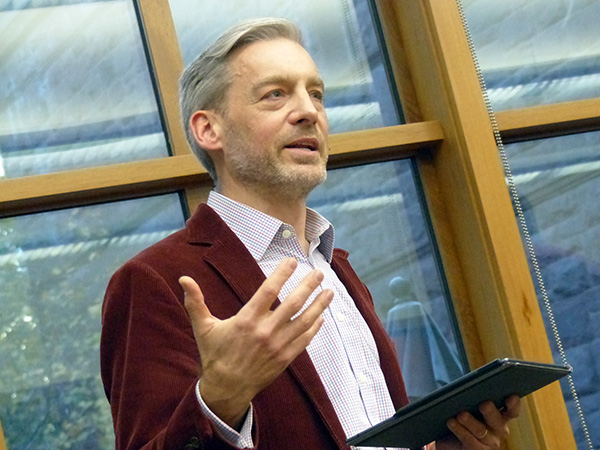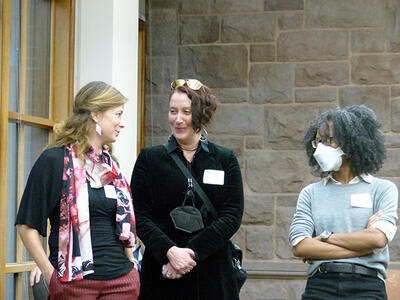Jacob Hacker Launches the American Political Economy Exchange (APEX)

This question will be on the final exam: What is the American Political Economy?
Institution for Social and Policy Studies (ISPS) faculty fellow Jacob Hacker knows the answer. Of course, he is also the one asking the question as he launches the America Political Economy Exchange (APEX) at ISPS.
“What is the American Political Economy?” Hacker said at a recent gathering of faculty and students. “I think it’s pretty simple. It’s research that’s interested in the interplay of democracy and capitalism in the United States.”
Simple in concept, but as complicated as the country and any discpline explored at the deepest levels.
“Historically, political scientists have focused their research on a single topic in isolation, such as Congress, the presidency, the administrative state, or the courts,” Hacker said. “But it’s really helpful to think about the interplay across all parts of our economic and political system.”
APEX is part of the Consortium on American Political Economy (CAPE), founded in 2020 with the support of the Hewlett Foundation and led by Hacker; Paul Pierson, the John Gross Professor of Political Science at the University of California at Berkeley; Kathleen Thelen, the Ford Professor of Political Science at the Massachusetts Institute of Technology; and Alexander Hertel-Fernandez, associate professor of political science at Columbia University’s School of International and Public Affairs. In 2021, they edited the book “The American Political Economy: Politics, Markets, and Power” to create a framework for APE.
In 2022, American Political Economy became organized section of the American Political Science Association, the discipline’s leading professional body.
In October, Hacker invited Pierson to discuss their ongoing work on the factions, agenda, and actions of the Democratic Party.
And last month, Hacker gathered a multidisciplinary group of faculty and students to launch the iniatiave at Yale, which will include research, workshops, lectures, visiting speakers, and conferences. Attendees included:
- Margie Adler, executive director of the Ludwig Program in Public Sector Leadership at Yale Law School
- Zack Cooper, associate professor of public health and economics and ISPS faculty affiliate
- Vanessa Ogle, associate professor of history
- Kevin DeLuca, assistant professor of political science and ISPS faculty fellow
- William English, the Eugene F. Williams, Jr. Professor of the Practice at SOM
- Allison Harris, assistant professor of political science and ISPS faculty fellow
- Joshua Kalla, associate professor of political science and ISPS faculty fellow
- Christina Kinane, assistant professor of political science and ISPS faculty fellow
- Brian Libgober, assistant professor of political science at Northwestern Univesity and senior research scholar at Yale Law School
- Zachary Liscow, professor of law
- Andew Metrick, the Janet L. Yellen Professor of Finance and Management at the Yale School of Management (SOM) and the Director of the Yale Program on Financial Stability
- Rourke O’Brien, assistant professor of sociology and ISPS faculty affiliate
- Nicholas Parrillo, William K. Townsend Professor of Law and professor of history
- Jason Schwartz, associate professor of health policy in the Yale School of Public Health
- Stephen Skowronek, Dara Strolo Pelatiah Perit Professor of Political Science and ISPS faculty fellow
- Dara Strolovitch, professor of women’s, gender, and sexuality studies, professor of American studies and political science, and ISPS faculty fellow
- Ian Turner, assistant professor of political science and ISPS faculty fellow
- John Wargo, Tweedy-Ordway Professor of Environmental Health and Politics at the Yale School of the Environment.
“This is fundamentally about connecting scholars,” Hacker said. “Both established scholars and up-and-coming scholars. We believe anybody should be able to contribute to research on the American political economy and help us build a body of work that is distinctive and gets at the substantively bigger questions we need to explore.”